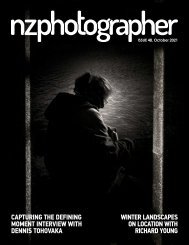NZPhotographer Issue 22, August 2019
As of December 2022, NZPhotographer magazine is only available when you purchase an annual or monthly subscription via the NZP website. Find out more: www.nzphotographer.nz
As of December 2022, NZPhotographer magazine is only available when you purchase an annual or monthly subscription via the NZP website. Find out more: www.nzphotographer.nz
You also want an ePaper? Increase the reach of your titles
YUMPU automatically turns print PDFs into web optimized ePapers that Google loves.
MORNING LIGHT, MARLBOROUGH SOUNDS<br />
F11, 1/125S, ISO100<br />
When arriving at a stunning landscape location, it is<br />
easy to get a bit overwhelmed and often the result of<br />
this is that you try to photograph the whole expansive<br />
vista in front of you. While there is nothing wrong with<br />
this approach, it can sometimes produce an image<br />
with no defined subject and little artistic vision.<br />
The first thing you should ask yourself is; what are you<br />
photographing? Yes, the beautiful view in front of you,<br />
but what part of this is your subject? And what parts of<br />
this view do not add anything to the image or distract<br />
from your subject? I think this is the most important<br />
question when shooting minimal landscapes, as you<br />
need to try and break down what your subject is and<br />
what elements do not add to the image and can<br />
therefore be removed.<br />
SUBJECT<br />
A painter has the luxury of choosing what to include in<br />
their painting, a photographer needs to choose what<br />
to leave out, this is harder than it sounds…<br />
Shooting landscapes with wide-angle lenses can<br />
produce some stunning results, but if not used well,<br />
a wide-angle lens can result in you capturing a very<br />
complex image without any clear subject. For this<br />
reason alone I think it is one of the hardest lenses to<br />
master. I find many photographers will seldom reach<br />
for a longer lens when shooting landscapes and<br />
this can often be a great way to help to simplify a<br />
landscape, by filling the image with your subject so<br />
that the viewer can easily focus on it. By focusing on<br />
a smaller area on a landscape, you can reduce the<br />
number of elements in your photograph, producing<br />
a more minimalist image with a clearer and more<br />
defined subject.<br />
NEGATIVE SPACE<br />
While the use of long lenses can help to simplify a<br />
landscape as discussed above, they can also work<br />
against you when shooting minimal landscapes.<br />
Negative space can be very powerful in an image.<br />
It allows the subject space to breath and can help<br />
68 <strong>NZPhotographer</strong>


















